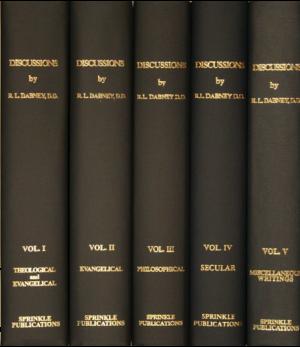
The great Southern Presbyterian theologian Robert Lewis Dabney has been mentioned a number of times on this site. It is a very telling indication of our times that such a visionary man is so little known, and usually slandered when mentioned at all. You can find the entire collection of his written works at the Dabney Archive, all of which are well worth reading. However, such a massive undertaking can be a bit overwhelming, and so on Sundays I have begun posting bite-sized excerpts from Dabney’s works with perhaps a little bit of my own commentary. This will be done in hopes of promoting wider readership for this great man. You can find links to all the previous “Dabney on Sunday” posts at the bottom of this post.
The following excerpt is taken from an article Dabney wrote for the Princeton Review, entitled “Secularized Education.”
Of all rightful human action the will is the executive and the conscience the directive faculty. Unless these be purified and enlightened, to enhance the vigor of the soul’s other actions by training is but superfluous mischief. If in a ship the compass be lost and the pilot blind, it is better that there should not be a great force to move her machinery. The more energetic its motion, the greater is the likelihood the ship will speedily be upon the breakers. Surely this is sufficient to show to the reflecting mind that right moral inculcation cannot be separated at any point or for any time from the intellectual, without mischief.
One very obvious and yet not the weightiest application of this truth is to the discipline of the school itself. No training of any faculty takes place without some government. On what moral basis shall the teacher who wholly suppresses all appeal to religion rest that authority which he must exercise in the school-room? He will find it necessary to say to the pupil, “Be diligent. Be obedient. Lie not. Defraud not,” in order that he may learn his secular knowledge. But on whose authority? There is but one ground of moral obligation, the will of God, and among the people of this country he who does not find the disclosure of that will in the Scriptures, most often finds it nowhere. But this teacher must not inculcate this Bible. Then his mere might must make his right, or else the might of the parent, or of the magistrate, to whose delegated authority he points back. Or his appeal may be to mere self-interest!
Will this government be wholesome for a youth’s soul?
But from a pupil the youth becomes a citizen. He passes under wider and more complex obligations. The end of the State schooling is to fit him for this. The same question recurs, with transcendent moment, On what basis of right shall these duties rest? As a man, it is presumable he will act as he was taught while a boy. Of course then the grounds of obligation employed with him in school should be the ones he is to recognize in adult life. In the State school a non-Christian standard alone could be given him. He cannot be expected now to rise to any better; he may sink to a lower, seeing the ground then given him had no foundation under it.
That is to say, young Americans are to assume their responsibilities with pagan morals, for these are just what human reason attains from the non-Christian standard. Will this suffice to sustain American institutions? One may say: Natural theism may deduce quite a high ethical code, as witness the Greek philosophy. So could a man who rightly construed the data of his consciousness be an atheist; even the atheist might find in them proof that conscience ought to govern. But he does not, nor does the pagan reason act as Epictetus speculated. Let us begin to legislate for the people as they ought to be, and we shall have a fine card-castle. In fact, Americans, taken as we find them, who do not get their moral restraints from the Bible, have none. If, in our moral training of the young, we let go the “Thus saith the Lord,” we shall have no hold left. The training which does not base duty on Christianity is, for us, practically immoral. If testimony to this truth is needed, let the venerable Dr. Griffin, of a former generation, be heard. “To educate the mind of a bad man without correcting his morals is to put a sword into the hands of a maniac.” Let John Locke be heard. “It is virtue, then, direct virtue, which is the hard and valuable part to be aimed at in education.” . . . “If virtue and a well-tempered soul be not got and settled so as to keep out ill and vicious habits, languages and science, and all the other accomplishments of education, will be to no purpose but to make the worse or more dangerous man.” Let Dr. Francis Wayland be heard. “Intellectual cultivation may easily exist without the existence of virtue or love of right. In this case its only effect is to stimulate desire; and this, unrestrained by the love of right, must eventually overturn the social fabric which it at first erected.” Last, let Washington be heard, in his farewell address, where he teaches that the virtue of the citizens is the only basis for social safety, and that the Christian religion is the only adequate basis for that virtue.
Previous Dabney on Sundays:
Universal Suffrage
Abstractions
Redefining Terms
False Philosophies
Abolishing Religion
Cruelty of Humanitarian Philanthropy
Southern Slavery
Labor Unions
| Tweet |
|
|
|




